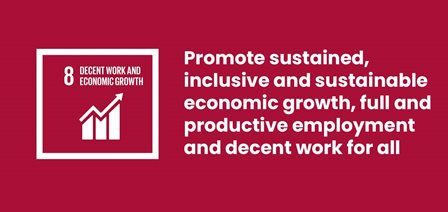Trends, Blog
What is Sustainable Development Goal 8?
Promote sustained, inclusive and sustainable economic growth, full and productive employment and decent work for all. These are the challenges that make up Sustainable Development Goal 8; let’s see how they’re going to be tackled
The rate at which a society develops is largely dependent on the socio-economic situation of its citizens and its industrial fabric, sustained and sustainable economic growth and its direct impact on the creation of quality employment being inherent in this process. This basic aspect of the economy is sometimes contingent upon an environment of ongoing volatility and instability, such as the one we are currently experiencing, which is not conducive to a balanced formula for success. Conditioning factors of this kind give rise to an increasing number of phenomena such as unemployment and job insecurity, which need to be tackled head-on. This is the reason why, in 2016, the United Nations, in its Agenda 2030 roadmap, set Sustainable Development Goal 8 as a reference point for solving these problems.
According to figures published by the UN, in 2016, 61% of workers were informally employed in a world where the unemployment rate stood at 5.6%. Moreover, there is a yawning gender pay gap, with men earning 12.5% more than women in 40 of the 45 countries surveyed. Globally, this gap stands at 23% and, at the current rate, would take another 68 years to narrow. These figures merely highlight the need for a commitment, on the part of all social stakeholders at international level, to put an end to these inequalities and to promote policies of stability for the future good of businesses and workers alike.
In the wake of the social, economic and public health blow caused by the COVID-19 pandemic, this initiative makes more sense than ever. However, in order to turn this situation around, it is necessary to set clear and achievable targets. So let’s take a look at the main targets of Sustainable Development Goal 8.

What are the targets of Sustainable Development Goal 8?
8.1 Sustain per capita economic growth in accordance with national circumstances and, in particular, at least 7 per cent gross domestic product per annum in the least developed countries.
8.2 Achieve higher levels of economic productivity through diversification, technological upgrading and innovation, including through a focus on high-value added and labour-intensive sectors.
8.3 Promote development-oriented policies that support productive activities, decent job creation, entrepreneurship, creativity and innovation, and encourage the formalization and growth of micro-, small- and medium-sized enterprises, including through access to financial services.
8.4 Improve progressively, through 2030, global resource efficiency in consumption and production and endeavour to decouple economic growth from environmental degradation, in accordance with the 10-year framework of programmes on sustainable consumption and production, with developed countries taking the lead.
8.5 By 2030, achieve full and productive employment and decent work for all women and men, including for young people and persons with disabilities, and equal pay for work of equal value.
8.6 By 2020, substantially reduce the proportion of youth not in employment, education or training.
8.7 Take immediate and effective measures to eradicate forced labour, end modern slavery and human trafficking and secure the prohibition and elimination of the worst forms of child labour, including recruitment and use of child soldiers, and by 2025 end child labour in all its forms.
8.8 Protect labour rights and promote safe and secure working environments for all workers, including migrant workers, in particular women migrants, and those in precarious employment.
8.9 By 2030, devise and implement policies to promoter sustainable tourism that creates jobs and promotes local culture and products.
8.10 Strengthen the capacity of domestic financial institutions to encourage and expand access to banking, insurance and financial services for all.
8.a Increase Aid for Trade support for developing countries, in particular least developed countries, including through the Enhanced Integrated Framework for Trade-Related Technical Assistance to Least Developed Countries.
8.b By 2020, develop and operationalize a global strategy for youth employment and implement the Global Jobs Pact of the International Labour Organization.